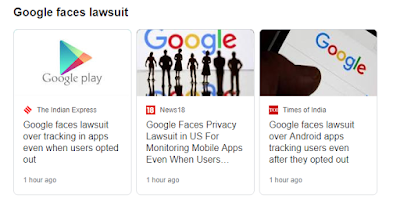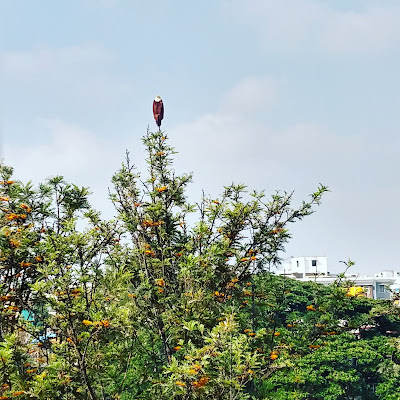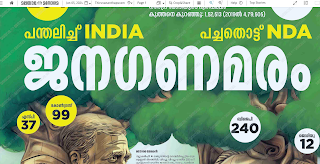It will take months or even years for this road dug up during the pandemic to return to normalcy.
The hapless residents will have to put up with such constant degradation of road facilities.
It will take months or even years for this road dug up during the pandemic to return to normalcy.
The hapless residents will have to put up with such constant degradation of road facilities.
In the 70s and 80s, school principals used to instruct students to read English newspapers such as The Hindu for improving English skills. But the last three decades had seen an erosion in the perfection of sub-editing across English newspapers in India. One can see lots of grammar and spelling errors, poor sentence structures, misleading headlines, and heavily editorialized news.
In keeping with the highest traditions of professional journalism, The Hindu had issued a correction to an error that I pointed out on Twitter on Dec 1, 2020.
On its front page, a news story had an error about the end date of the current Assembly term in Karnataka. Instead of 2023, the news story mentioned the year as 2013. A silly mistake.
In a paper, No evidence for increased transmissibility from recurrent mutations in SARS-CoV-2, published in the Nature Communications journal, the authors state that none of mutations identified lead to the increase in the spread of Covid-19.
This definitely is good news.
The paper also lists three ways in which the SARS-CoV2 virus mutates in infected humans:
The paper says that out of the identified total of 12,706 mutations, about 398 strongly supported recurrent mutations were observed. It also added that the genomic diversity of the virus remains low, but vigil should be maintained continuously.
If you think air pollution can be controlled by maintaining the status quo, then you are probably mistaken. Pollution is linked to our day-to-day activities. It is the stark reality.
In Bengaluru, the primary reason behind air pollution is that there are lots of vehicles on the road, especially during peak hours. The more vehicles that you add to the existing number, then the air pollution will keep on increasing.
Air pollutants do not vanish overnight. They stay in the air and they will react with other chemicals to form toxic compounds that create eye irritation and respiratory issues. If night temperatures are less, the chemicals trapped in dense air will disappear next day only.
To reduce air pollution in Bengaluru, do the following:
This is the saddest and the most controversial solution that nobody will agree to. There are over 83 lakh registered vehicles in Bengaluru, says a report in the Deccan Herald newspaper. The city has to reduce its vehicle numbers. Reduce the number of diesel vehicles whether they are private cars, cabs, buses, or lorries.
Discard vehicles that are old and polluting than the rest. Allow only healthier old vehicles to remain with stringent anti-pollution standards. Allow exceptions based on well-defined criteria. For example, the poor and farmers may need some exceptions.
The traffic police authorities can also cancel the registrations of vehicles against which more than three grave traffic violations have been reported. If the violations are more than five, consider sending these vehicles to a local reuse and recycle economy to provides jobs to local people.
Consider a quarterly or annual cap on vehicle registrations. Link vehicle registrations with air pollution levels. For example, if quarterly air quality data exceeds the defined levels, stop or slow down registrations. Consider an annual cap on SUVs. Make this process transparent.
Review the fuel policy and ensure that you move towards greener, less polluting fuels. Stop adulteration of fuels on a war footing. Start a helpline to let citizens to report fuel adulteration. Set milestones on how you will achieve this.
Strengthening public transport is the universal solution for air pollution control. But public transport stacked with hundreds may not be ideal. Encourage suburban railway networks with good bus connectivity to inner areas. Don’t leave commuters stranded at railway stations.
The Covid-19 lockdown has proved that working from home does work. It can be the new normal and not a reluctant exception. Encourage work from home or work from anywhere policies among trusted employees. Provide incentives to employees who use public transport more than private vehicles.
Another universally recommended solution to curb air pollution. But perform a pilot health study before you create cycle lanes. High temperatures, poor roads, heavy traffic, suspended particulate matter (SPM), and air pollution pose risks to cyclists.
Even residential areas are not free from loud diesel generators contributing daily to the particulate matter pollution in the city. Daily power supply disruptions are the primary reasons why these generators are widely used.
Bengaluru needs a sustainable construction policy whether it is for residential areas, high-rises, office space, or for the metro trains. There is tremendous air, water, and noise pollution from construction activities in the city. There is nobody to regulate the pollution caused by construction activities. The levels of noise and dust pollution caused by bore well digging is unimaginable in any other modern city.
Burning of solid waste on the streets is very common. Residents realise only when the acrid smell reaches their nostrils. Residents can play a big role in stopping this practice by forming neighbourhood teams to report such violations to the authorities.
I am not a big fan of India's prime time debates, especially those by the so-called national media. I still scour the print media for news and editorial views and social media for comments (both valid and stupid).
To me, most of the prime time debates are just one-sided cacophony and in a democracy like India these unprofessional conduct should have been regulated and punished long back. It may be the case that as a trained journalist, I can research more on the fare dished out and check facts and fake news by all forms of news media.
Such a luxury may not be available to all viewers and they then become the primary victims of targeted propaganda through social media.
Against this background, I was not at all surprised at the belligerence in which the anchor at NDTV was shouted at by an 'expert'. The discussion was about the booming stock market amidst a tanked economy and a pandemic.
Stock markets are not the best indicators of an economy. So it is ridiculous to consider stock market variations as an evidence of the health of the economy. And investors are not the 'real' experts that the media should be inviting for debates on economy and issues of farmers.
In every channel, one can see such 'experts'; some are called 'political observers'. What exactly is this 'political observer' and what is the criteria for dubbing someone as a political observer. In India, everybody has an opinion on anything under the sun. In that vein, a man on the street is also an observer.
How many poor people have you seen, except in times of tragedies or natural disasters, in TV studios? How many poor farmer leaders have you seen in prime time debates? How many poor workers, who left the cities following the lockdown, did you see on these national television studios? How many reporters interviewed them, except for suitable sound bytes for ground reports? How many environmentalists did these channels feature in their discussions?
Since we all know that the answer is No, then how can we expect these news media to serve as the Fourth Estate? There is no discretion in including 'experts' in prime time discussions on Indian news channels. To 'balance' the debate, channels include political spokespersons and 'independent' spokespersons who support a party.
But the biggest problem is including rich or successful people as experts when they are actually 'political operatives'. In the past, we have seen investors, advertisement professionals, the so-called activists, corporate honchos, and actors in news studios who are actually willing partners in the larger political script and propaganda.
When you don't practice discretion in including experts, when you try to 'balance' opinion by inviting political operatives. there is no debate, but cacophony. The viewer's right to facts gets thwarted here and it just becomes absolute waste of time and energy.
So, go back to newspapers, talk to people that you know, learn to perform your own research, abandon prime time discussions, and say no to fake news and propaganda. Indian democracy and your world will be much much better.
 |
| Add caption |
 |
| A kite perched on top of a tree in Bengaluru |
 |
Some images of front pages of newspapers after votes were counted on June 4, 2024 after a ridiculously long parliament elections. Did the ...
